Words by Amon Warmann
Bizarre. Weird. Unusual. These words pop up time and time again when discussing Henry Jackman’s work on Cherry. The film marks the composer’s latest collaboration with the Russo Brothers, whom Jackman has previously worked with on Marvel Cinematic Universe epics Captain America: The Winter Soldier and Captain America: Civil War. And that’s not the only Marvel connection here: fellow MCU alumni Tom Holland stars as the film’s titular army medic, who after returning home to his girlfriend Emily (Ciara Bravo) with PTSD soon begins robbing banks to fund his drug addiction.
It’s a film that saw Jackman “dig deeper than ever before”, and when we catch up with the composer at his Santa Monica home via Zoom, we talked about his score’s experimental qualities, working with the Russos, and why working on Cherry during a pandemic was a blessing rather than a hindrance.
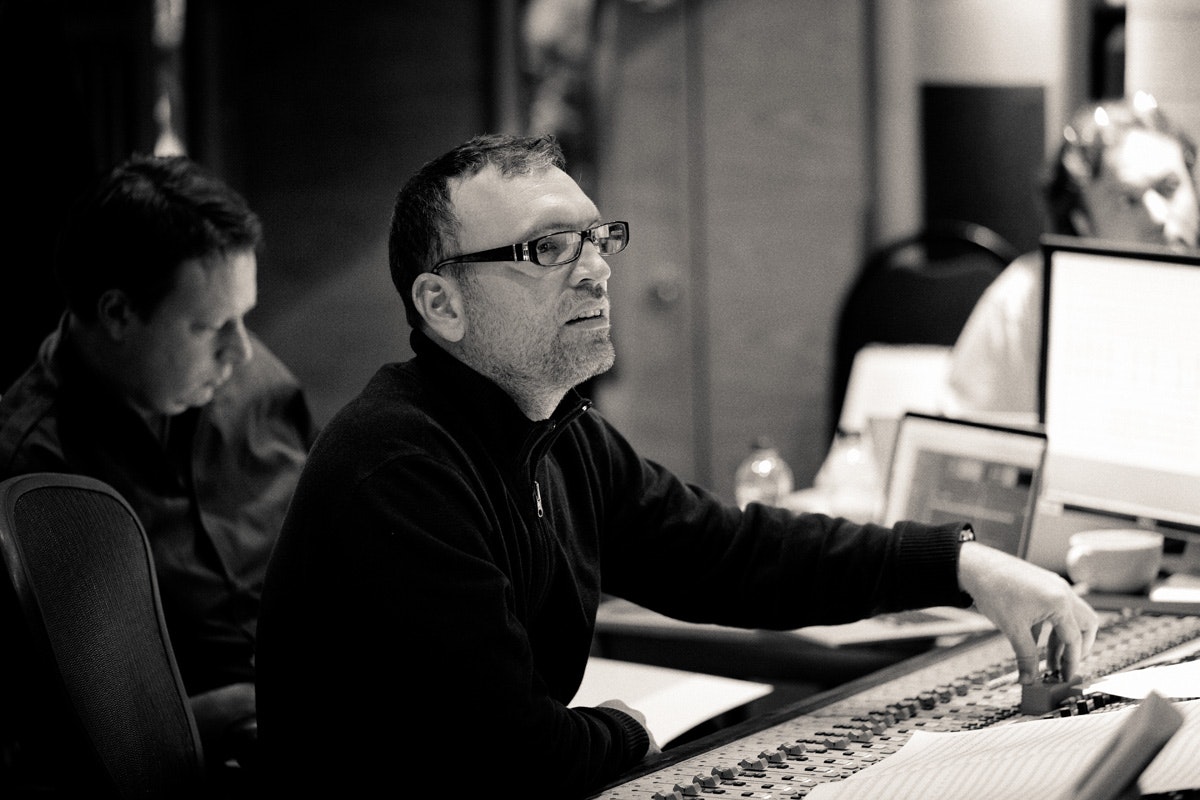
I want to start off by going way back all the way to the beginning. Do you remember the first instrument that you ever played?
I do actually because it sort of involved vandalism. My Dad was a composer, and when we lived in London there was a spare, rickety, old piano. I figured out that certain keys sounded cool if you played them together. And without my parents seeing, I grabbed a felt tip pen and started coloring different bits of the piano so I could find the keys that I really like the sound of. And so aged four, the piano had been covered in all these felt tip marks and my parents said: “I suppose we’d better see if we can find a piano teacher”. So I started on piano lessons when I was about four on the back of basically having defaced the piano.
Oh, that’s amazing. That’s one way to start for sure. And when did it click for you that composing is something that you wanted to do and pursue?
It’s funny because I worked in the record industry. Records are quite a long way from film composing. So I think in my early 20’s I was lucky enough to work with Trevor Horn and Hans Zimmer, which is sort of two peas in a crazy peapod of good luck. And so I’d actually had a really strict, formal, classical type education from about eight years old. I went to St. Paul’s Cathedral Choir School in London, so that involved signing ecclesiastical classical music four hours a day. It was like being in a monastery basically. Then I studied classical music, and then I went completely off the rails. Having had all this classical education, it was all like drum and bass remixes and two-step garage remixes for a while, and I was too cool for school. I didn’t want anyone to know that I’d been singing Palestrina and Tallis and playing Brahms Rhapsodies on the piano, or that I’d written all these long-winded essays about musicology. I just loved electronic music, and I’d had enough of all this formal education.
I think from the late ‘80s I sneaked off from school and went to some of those late ‘80s acid house parties. There was all this Chicago House music. And because I had a classical ear, I was like, no, no, no — you can’t do that. You can’t go C minor, F minor, B flat minor. That’s wrong. But the more I went to these parties, the more I was like - screw it being wrong! These chords are just a totally different way of doing things. Because in those days, people would sample a chord on a sampler, and just move their finger around. So you’d get this constantly moving minor chord that broke all the sort of harmonic rules. And that was the beginning of me just going off on a big electronic and dance music thing. So for a while, I was a long way from all that sort of classical study. And then I don’t know, towards the end of working in the record industry, I remember my Dad saying “if you get a chance to do film music, you should jump at it”. That was in the middle of me doing that drum-bass, and I remember thinking at the time - film music, isn’t that the kind of thing that old guys do? Do you know what I mean? It’s not very cool. But then I think towards the end of my time in the record industry, and even though I was lucky enough to work with some exciting people, the fact of the matter was that it was always three and a half minutes of music and the chords were never gonna be as exciting as like Debussy or Szymanowski or whatever. I just started to get the itch.
I remember being really inspired by Bjork’s album, Vespertine, ‘cause although it was Pop music, it was really art music. It had really modern electronic, aleatoric drums. It had a beautifully recorded choir. It had a symphony orchestra. It was just beautiful. So I did my rubbish version of Vespertine where I took all these famous classical pieces and imagined what would happen if they were produced now by like Marius de Vries or Mark Bell or something at the time. Anyway, Hans Zimmer got to hear them and went, “oh, this is way out there. Who is this? Where is he?” And I had a long chat with him. It was an absolute revelation because I think I’d always just associated film music with distinguished old men like John Williams. And I was hanging out with Hans, going, well, he’s just a much better version of me. He’s interested in synths and he’s eclectic and he’s a bit of a renegade and he’s not boring and posh. And he just said, “I don’t know what you’re doing in the record industry, but it’s a complete waste of time mate. You need to get out of that. You should be doing film music”. So I was like...okay.
I think in my early 20’s I was lucky enough to work with Trevor Horn and Hans Zimmer, which is sort of two peas in a crazy peapod of good luck.
When Hans Zimmer tells you to do something…
Yeah. I just couldn’t have been luckier. So that’s a very brief history. My parents didn’t have much money or anything. But I got these scholarships to get all this classical education. And then there were these sort of long periods of trying to hide from that. At the time I remember my Mum was a bit distraught because I had passed all my piano grades. She couldn’t understand why in the sort of mid-'90s all this stuff was coming out of my bedroom. But retrospectively it was actually really cool because, by the time you get to film music post the ‘90s, it’s not like you can’t have a career if you’ve only had classical training. You can have a career. And if you’ve only come from the record industry, you could definitely do film scores. But if you’ve sort of been in all of that, it’s actually useful. There are some movies where profound knowledge of the symphony orchestra is not gonna help you at all, and you’re gonna get found out if you don’t actually know what you’re doing. It’ll just sound like your Grandpa trying to nail dubstep. Conversely, if you don’t really know what you’re doing with an orchestra and you’re trying to do Harry Potter, you’re gonna get found out.
When was the last time you and Hans spoke?
Oh, literally the other day. We don’t see nearly enough of each other - Covid’s a disaster for that kind of thing - but I will be aware until the day I die that I may very well not have even done film music if it hadn’t been for Hans. The biggest lesson he ever taught me was don’t think of it as just writing music, think of it as telling a story. I didn’t quite understand that when I first met him, but that was the pure gold piece of advice.
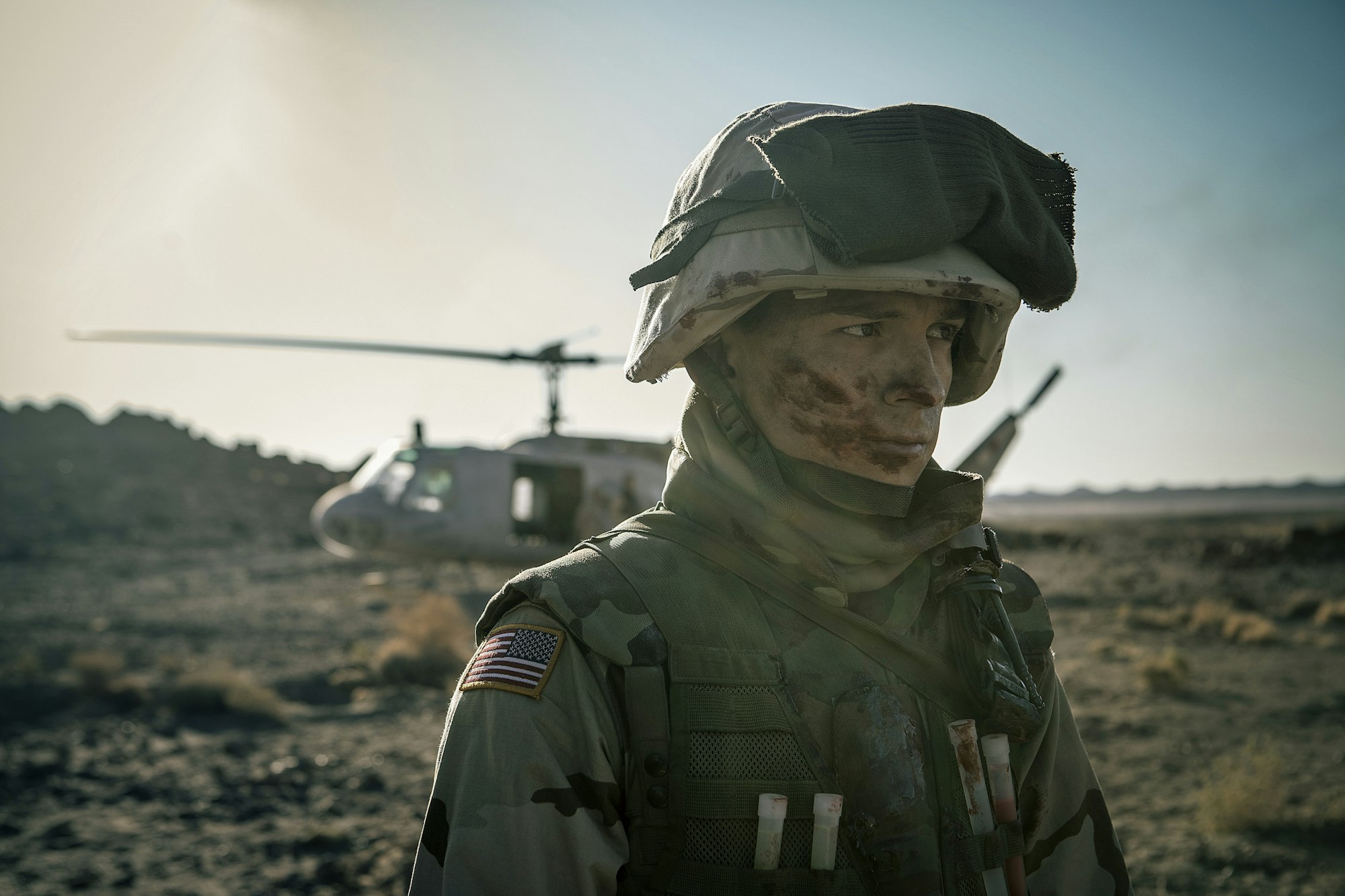
When did you first hear about Cherry from the Russo Brothers? And what made you say yes?
I probably heard about their intention to make Cherry a good year before they started shooting it because I’m pretty close with Joe and Anthony from Winter Soldier and Civil War. They set up their own company [AGBO] as a sort of artistic outlet for their own stuff, so they were keeping me informed about their plans and what they may or may not be doing and I read a script pretty early on. They’re so good, I’m trying to think of a scenario in which Joe and Anthony go, “hey Henry, would you like to do the music for this?” And me going, “o, not really”. But aside from that, I read the script and what was really obvious to me was that Cherry was sort of like their Revenant. Having just conquered the world with Avengers: Endgame, it’s not like they didn’t enjoy that or didn’t like it but they had proved themselves. It’s the biggest movie ever. So then their next venture was like the opposite of that.
I think the story really appealed to them. It had the whole issue of P.T.S.D. and soldiers coming back from Iraq. Whilst it has some disturbing subject matter, it’s also wryly humorous. And it’s really eccentrically put together as well. You know how sometimes you get a movie, but because the subject matter is worthy or of social interest, the movie itself may not necessarily be that interestingly made? This is really quirky. It's extreme, which was a real challenge for the music. But yeah, I was in from the get-go.
Then when they actually went ahead and shot it and put it together there was a whole extra layer of directorial individuality that wasn’t even in the script. Joe and Anthony had this vision of how to chapter it and have different cinematography for different sections. It even surprised me with how creative it was, and that impacted the music. I had to dig deeper than ever before.
You mentioned some of your influences earlier, and you also have a background in electronic and pop music. I feel like with this score you get to flex both sets of those muscles in a very big way. How quickly did that dawn on you once you started work on this movie?
Now that we’ve had the conversation we’ve had, I’ve suddenly realised in a way it’s a perfect example of the fact that I did have these sort of two different backgrounds. But the funny thing is that when I was in the heat of battle, I don’t think I was conscious of it at the time. But the point you’re making is a really good one. Because when I think about it, there’s a piece called Carnival of Losers which appears quite early on. The lineage of that is probably a bit Erik Satie, Chopin, and Debussy. But then if you listen to the first track, and it’s a sort of big, soaring theme that’s all on analog synths which is much closer to Blade Runner than Debussy. Then once the film gets to Iraq, it’s like if you took some of those really artsy Talk Talk albums in the late ‘80s, mixed it in with Radiohead, and then just sort of dumped lysergic acid on the whole thing, and it’s very un-symphonic.
There’s a very minimal track called Your Fate Is Darkly Determined, which is probably closer to some of the Aphex Twin type of music. I love Aphex Twin - despite writing really minimal electronic music, there’s a sort of compositional integrity to his stuff. I don’t know his background. I secretly think he went to music college or something, even though he writes these really, really spare pieces. Anyway, the point is you’re absolutely right. If I think about it, it’s got the textural influence of some of those classic analog synths that you might think of the early ‘80s, mid-'80s like Vangelis. And then it’s got the sort of piano etudes that show up in French chamber or solo piano music.
All that Iraq stuff is what happens when you spend forever mangling. I remember with a lot of the Iraq stuff, Alex Belcher - who’s this great guitarist - said we had to get a Roland SDE-3000, because it does some weird feedback, modulating bend effects that we can shove the guitar through that’s just not the same as plugins. And there was a lot of that. There was a lot of kick. By the time I got to the P.T.S.D. and Oxytocin, the losing your mind part of the film, even though I’d done loads of sound design I became so obsessed by having a sound that wasn’t stable. Even when I was happy with a really unusual sound, I needed one more level of instability. I started doing things like laying stuff onto cassettes where the motor isn’t quite working properly, so there’s loads of flutter and shoving things through seriously old, mid-'70s synths where the oscillators are a bit damaged and the filter’s a bit noisy. So it was a combo of using my digital sequencer and a lot of old school kit to just fuzz things up. And half the time, I wouldn’t quite be in control of what was happening, because these things were so unreliable.
We had to get a Roland SDE-3000, because it does some weird feedback, modulating bend effects that we can shove the guitar through that’s just not the same as plugins.
Would you say that you got to experiment with this film more than you have in previous projects?
Oh, definitely. Because I worked with Joe and Anthony before, you build up a sort of backlog of creative trust. Because one of the things about being adventurous is it necessarily has to involve a bit of fear. If you do something within slightly known barriers, then you’re less likely to think, well this could be brilliant or it might literally be total rubbish. It’s a bit difficult to know at this point ‘cause it’s so experimental. At the beginning of Cherry, I didn’t want to just write cues. I ended up writing pieces. There’s a piece called The Comedown where I said, okay, I’m gonna write a piece called The Cherry Suite. The Comedown is a development of an arrangement of that piece.
‘Cause to me, there was gonna be so much eclectic variation in the score and so much weirdness that the challenge was let’s see if, despite that, I can lay the pipe for this big tune and a couple of motifs that can just seed its way through the movie. So that I don’t get the “hey, it was really varied, but it was a bit of a dog’s breakfast”. “Maybe I could pull off a “hey, it was really varied, but also it wasn’t a dog’s breakfast because there was some kind of thematic unity to it”. So I wrote that piece. I wrote another piece called ‘What I’m Trying To Say Is’, which has this weird ukulele and mbira, Andean, and harps. It sounds like some weird, infantile, indie Rock ballad. It’s a very bizarre piece.
And Joe and Anthony — they’re so cool. I would just send them and go, “look, I know it’s a bit weird that nothing’s to picture. I’m just gonna start writing”. And they loved it. They were like “ah, this process is great. Let’s start like this”. And then they would wax lyrical about it. And sometimes Anthony or Joe would go, “hey, you know what this says to me? This piece says Emily. I reckon we should throw this around the end when he meets Emily”. Let’s just see what it feels like. If you’ve got the time, it’s a great way of working. It’s also a bit scary, ‘cause if you commit to writing a seven-minute piece of music away from picture, where you’re really committed, you’re spending ages on all the engineering that it’s almost like you’re really a recording artist. It’s like track 5 on your album. It’s all well and good, but if it doesn’t work, it’s like three weeks gone down the drain. ‘Cause I wouldn’t show them little bits. I’m like, let me finish it like it’s a nailed thing. And so when you start an adventure like that, you often don’t really know where it’s going. So you have to sort of just live with this — if someone were to call you and go hey, what’s the idea exactly of this piece and where exactly is it going in the movie? At a certain point you’re going, the answer is I don’t know to both questions. But just leave me alone for a bit and we’ll see what happens. And you need a good collaboration to feel the encouragement for a process like that.
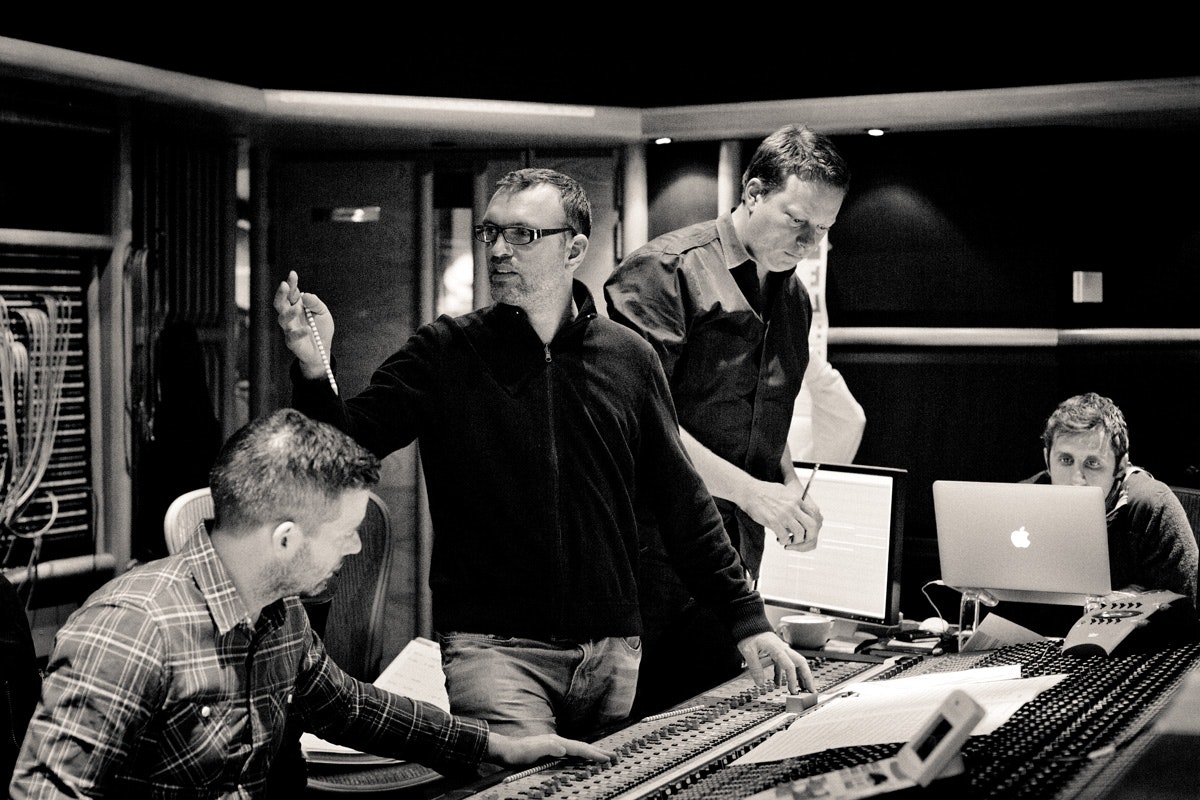
You mentioned that you saw a version of the script a year before they started shooting. When did you start first putting down ideas for this score? And what sparks your creativity more - the script? Or is it when you see the first cut, or after a conversation with the Russos?
I think I started putting down musical ideas I believe in February 2020. Then we were probably finished mixing in September. So it’s a good chunk of time. I think when I read a script, at that point I’m not having really specific musical ideas. If I was a genius, perhaps I’d be able to do that. Sometimes when I’m reading a script, I’ll read it and go, oh, well hold on a minute, I haven’t been thinking about music for a bit like I should be doing. I think when you first read a script, there’s an element of it where I go back to my days of having a really good English teacher. You should sort of stick with the narrative for a bit and read it a bit like you’re doing English literary criticism. Read it once. Read it again. The first time you read something you’re always going to get this audience-style overall impression, which is great. And then when you read it again, you start to think like a filmmaker and ask how has this been put together. What’s the character development like? What’s the architecture of the story? At that point, I may still not actually be thinking about even an instrument or colour or vocabulary. In conversations with Joe and Anthony, I think that’s when it all starts to sort of bubble up to the surface. By the time I’ve finished a conversation with them, even though it hasn’t actually had any specific musical instructions or anything, there’s some sort of wavelength thing where you feel like you’re starting to tune into the broadcast that they’re emitting because of the strength of their personality and their vision. It’s quite a difficult experience to describe.
For Cherry, the very first thing I did was to sit at the piano and figure out the beginnings of the theme. No technology. Just piano. I thought, well I don’t know what that’s for, but I’ve got a feeling that could be the kernel of something. And of course, that became the grand ending, but that theme actually appears right in the first cue and it appears in all these other tracks. I think that was the first stepping stone before I wrote Carnival of Losers, which is that slightly Chopin bit.
We put together a temp. It’s really cool because it’s got all these weird pieces in it. But of course, what it’s missing is “hey Henry, here’s the mission, but I don’t know how you’re going to do it, but you have to do it. It’s gonna be one of the weirdest scores ever. You have to dance the line. It’s going to have a love story, but it can’t be sentimental. It’s going to have Iraq, but it’s not a war movie. It’s going to have satire in it, but it’s not like Catch-22. It’s got all these things and we’re going to go everywhere with the music. But you’ve somehow got to unify it at the same time. So good luck”. That’s why I started with that one idea on the piano because despite the fact there are so many weird noises, having some unifying motif and a theme that goes with it that can then be contorted and modulated was my goal. I just sit at the piano and if something starts happening, I often just bang it in the phone voice memos. If I wake up in the morning and listen to it and go, “well, I don’t hate that actually”, then it’s in. And if I hate it, I just get rid of it.
I started doing things like laying stuff onto cassettes where the motor isn’t quite working properly, so there’s loads of flutter.
It’s become clear to me that adding layers to a theme is the bread and butter of film composing. Do you start off by completing a fully layered version of a theme and then strip it back or do you start with a stripped back theme and then add to it depending on whatever the film needs from scene-to-scene?
It’s slightly different in this case because rather than go straight into the cues, The Comedown appeared in what I originally called The Cherry Suite. And I think in that case the answer to the question is sort of all of the above, ‘cause this original Cherry Suite I wrote starts off with that really simple piano, and then the main tune comes in and it completes itself. So the first round really is a simple accompaniment plus an expression of tune from top to tail. If I stop the piece there, it would’ve been like a minute and a half long. The piece ends up being seven minutes long, so then other things start coming in. I’ve made this cool sound on my NKS 15 that sort of felt very emotive and a bit like from a different era, a bit Blade Runner-y. In the case of Cherry, my first round of the basic suite had just accompaniment and the completed tune. Because without the completed tune you could do all this work on texture, but if you then figure out you’re changing the tune and nailing it two weeks later, you’ve got to adjust everything. I try to iron out the basic DNA when possible.
Some of the more melodic music that you use is when the main character, played by Tom Holland, is high on drugs. And it almost feels that you want the music to wash over you like he’s riding a wave.
Yeah, there’s definitely an element of that. It’s an interesting one because the portrayal of drugs in the movie isn’t either positive or negative. It has sort of fun aspects as well as dark aspects. Drugstore Cowboy is a movie where they’re always raiding pharmacies to get drugs and it’s not a disapproving film. It’s kind of cool. It’s also not cool. They end up in a mess. The music surrounding some of those drug experiences isn’t the sort of music the government would want you to write to put you off drugs. But it's not glamorising it either. With the melody and harmony for something like Carnival of Losers, it has a more traditional approach to writing and music. Some of the drug experience music is more visceral and has to do with literally creating sounds that you sort of respond to more neurologically than you would intellectually. And so a lot of that was to do with the corrupting and warping of guitar textures that you just sort of responding to on a slightly more visceral level. It’s like getting one of those mirrors that distort your image, so it starts looking a bit peculiar.
That’s where a lot of that production stuff came in where I was using things like an old Roland Space Echo. I would put a sound through it and wait till it hit the bit of the tape that’s all mangled and get all these weird noises that destabilized the sound. It’s literally just a really, really worn piece of tape from the early ‘80s that isn’t functioning properly anymore. Good luck trying that with a plugin.
There’s one track that stood out to me - it’s called It Was Perfect. What drove the selection of the instrumentation for that one?
There’s some famous philosophy about rolling the dice and then making decisions off the back of it. I’d love to say that I knew exactly what that piece was gonna sound like. I filled the garage with a selection of instruments that was almost randomly determined of what was in storage at the time. And it was an Andean harp that I picked up in Peru in 1995. A ukulele that I bought like a gormless tourist at the Rarotonga Cook Islands Airport. A zither that my father left me that I had no idea how to play and two of its strings were missing. I had no idea and I just set up a mono mic in the middle of the room and just picked up each one and went, okay, let’s see what we can do with it.
And I just built it up. I didn’t know where it was going. It was built up in sort of LEGO bricks of what I was capable or competent enough to put together, and it started to take on a shape. So even though I’m utterly useless at these instruments, the naivete’s actually helping me in a way to make this really unusual piece. And there was another instrument which I ended up just calling the Magic Circle that was like a massive black grapefruit, which to be honest I didn’t even know I had. Don’t know where it came from. And it had Korean or Chinese writing on the box. No instructions. Had some mallets. And it was sort of like a very weird, sonorous marimba. So I used that. It’s the thing that goes ding, ding, ding on the track.
So it was very much a case of Joe or Anthony would say, “Hey, what are you up to?” And I’m like, “well, don’t ask me exactly. I’ve got an Andean harp, a zither, a ukulele, a weird, sort of black grapefruit thing with some beaters on it, a couple of other things and I’ve just started something. It absolutely could be the most embarrassing thing ever presented or if you let me with it long enough, it might be sort of interesting”. And when Joe and Anthony heard that, they went “that’s the Emily sound”. So it was perfect. That’s when you hear it. It’s one of those rare moments when he doesn’t feel like a fish out of water and things are going well before he goes to Iraq.
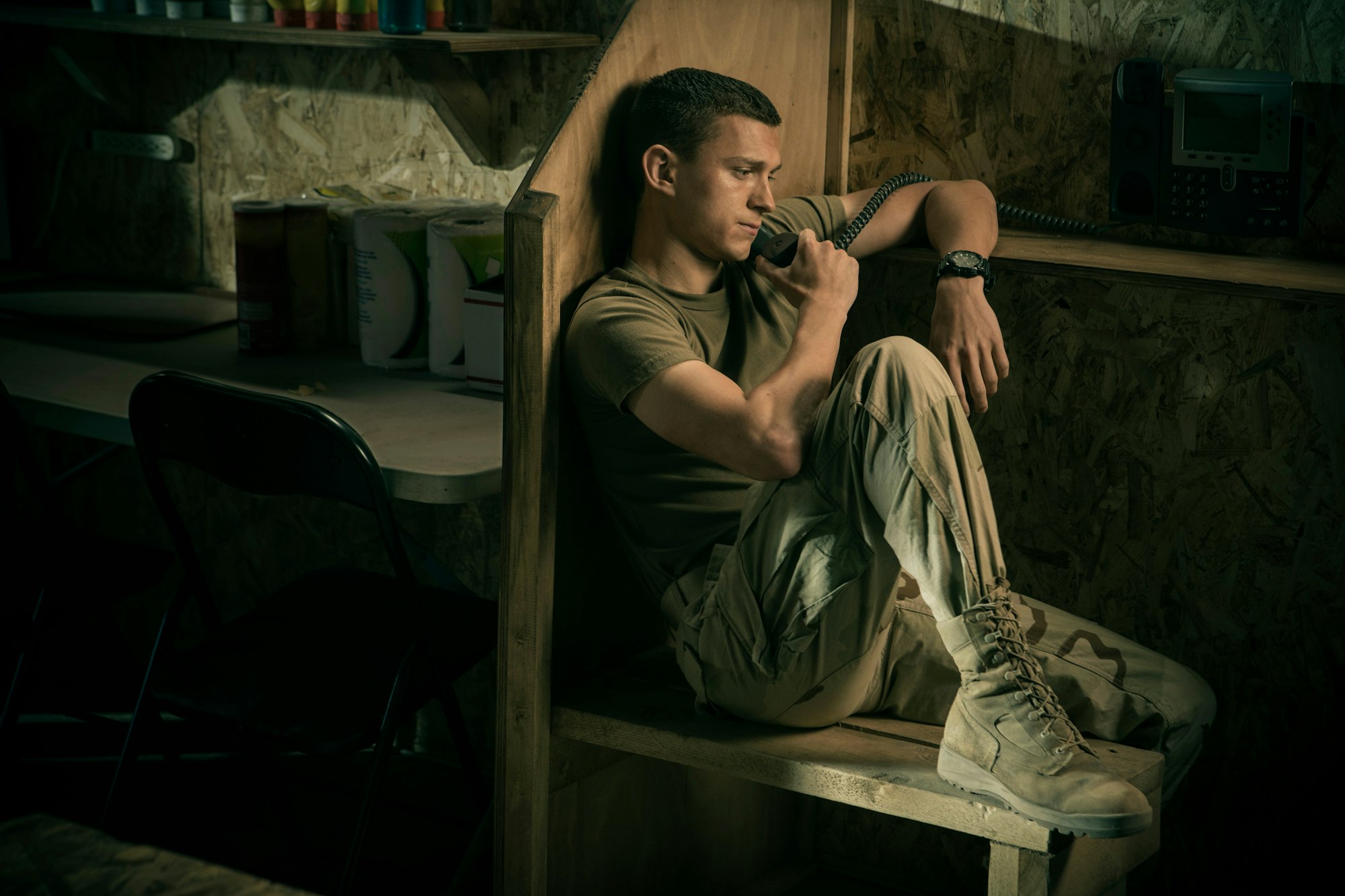
From everything you’re saying, it sounds like the fact that you had this prior relationship with the Russos was a major factor in still being able to experiment so much despite having to work on this in a pandemic.
Oh, that’s so true. Because it’s not a symphonic score, it was sort of a score where I was like a mad professor in my private laboratory doing things. And because that experiment didn’t involve a giant symphony orchestra, it was sort of rough and ready. If there was a movie that I would choose to do in Covid this would be it. It doesn’t necessarily need loads of people and big spaces and whatnot. And then on top of that, the fact you’ve had a previous relationship means that you can feel that you can go off into these laboratory processes with no real idea what you’re doing for a while and not have that creative uncertainty on your shoulder. That’s definitely a factor. Despite there being Covid, Cherry did not suffer. In fact, it might have even been a silver lining. It might have even not been as good if I had more access to the orchestra. It might not have been as discursive and odd and unusual.
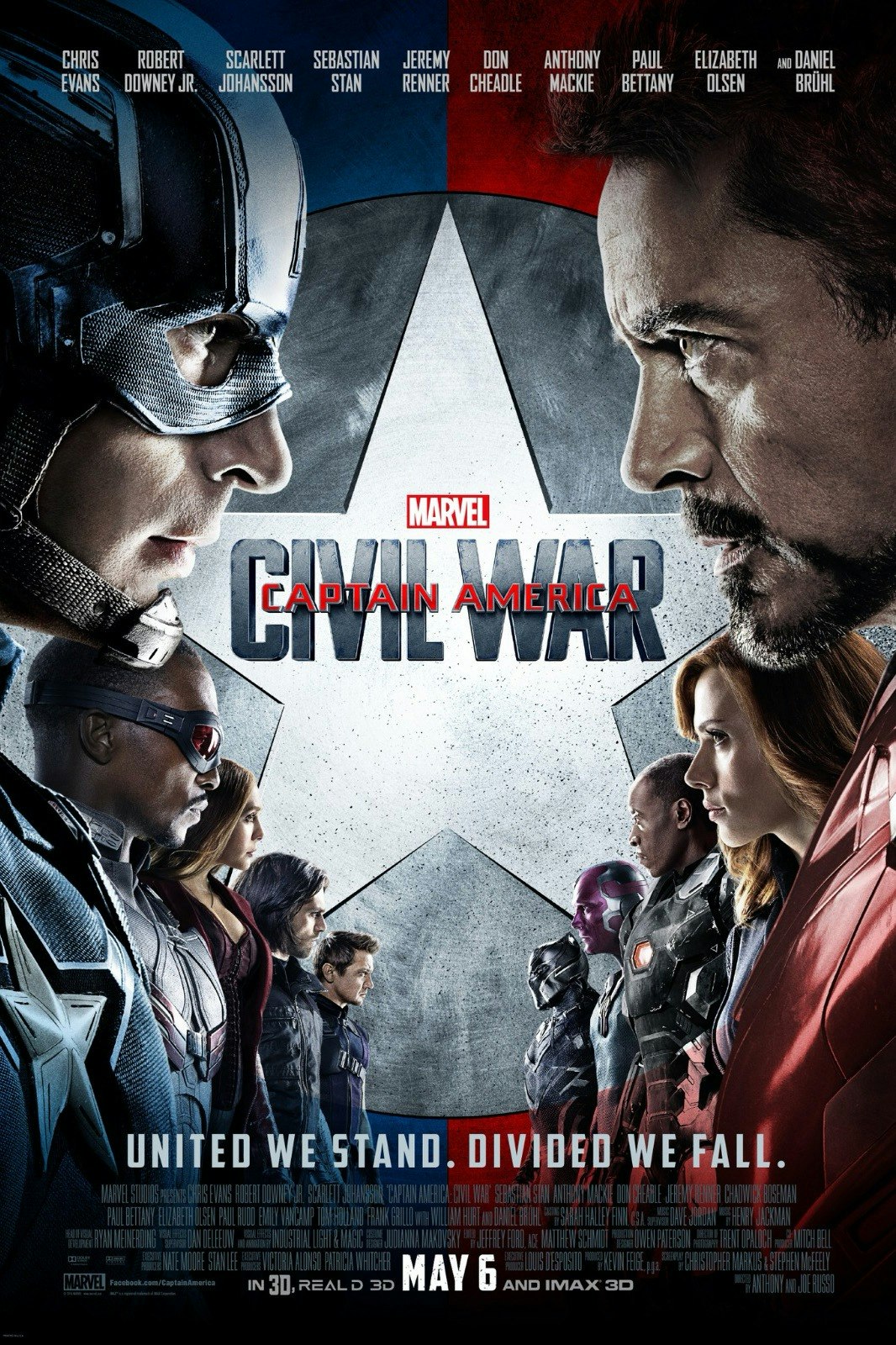
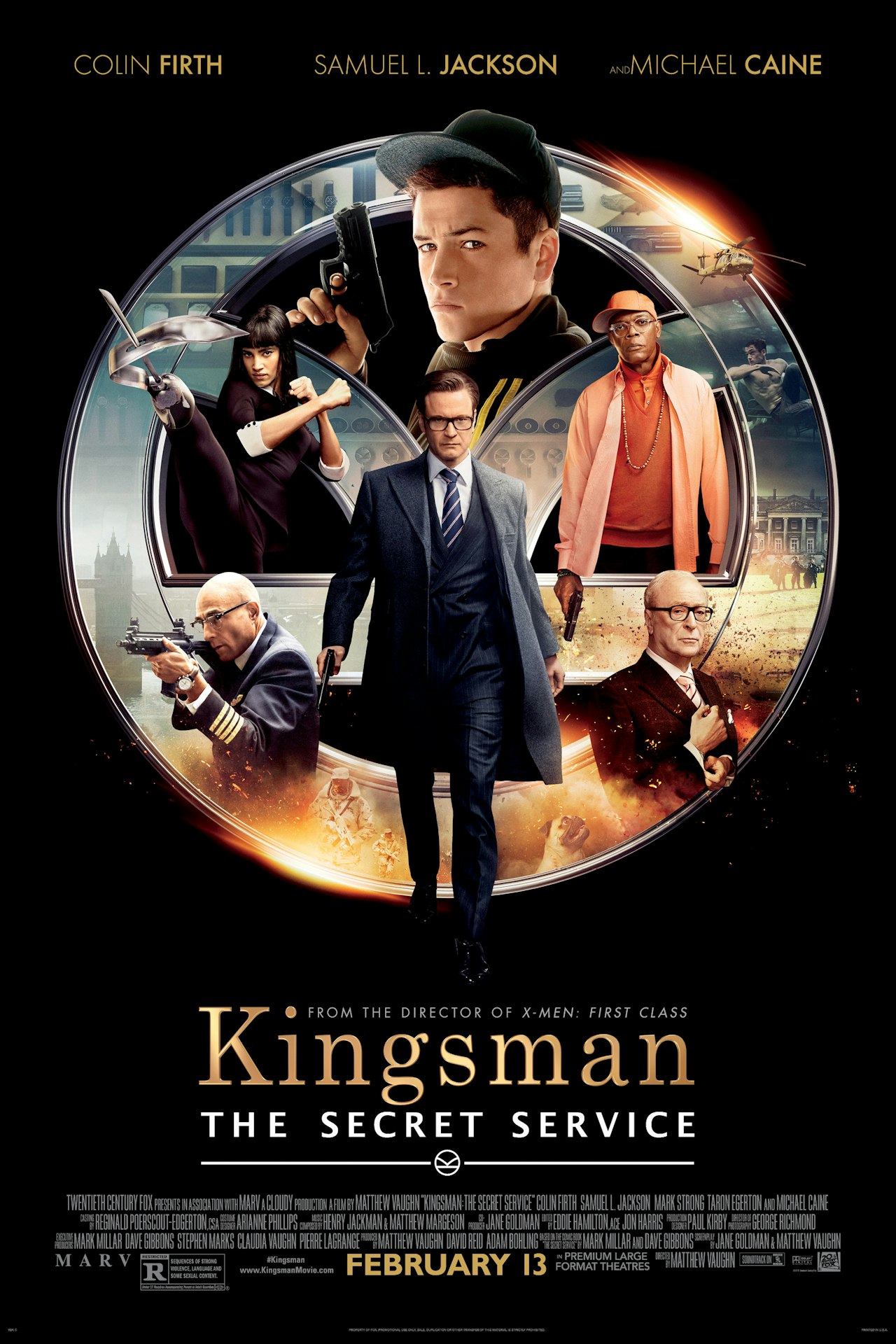
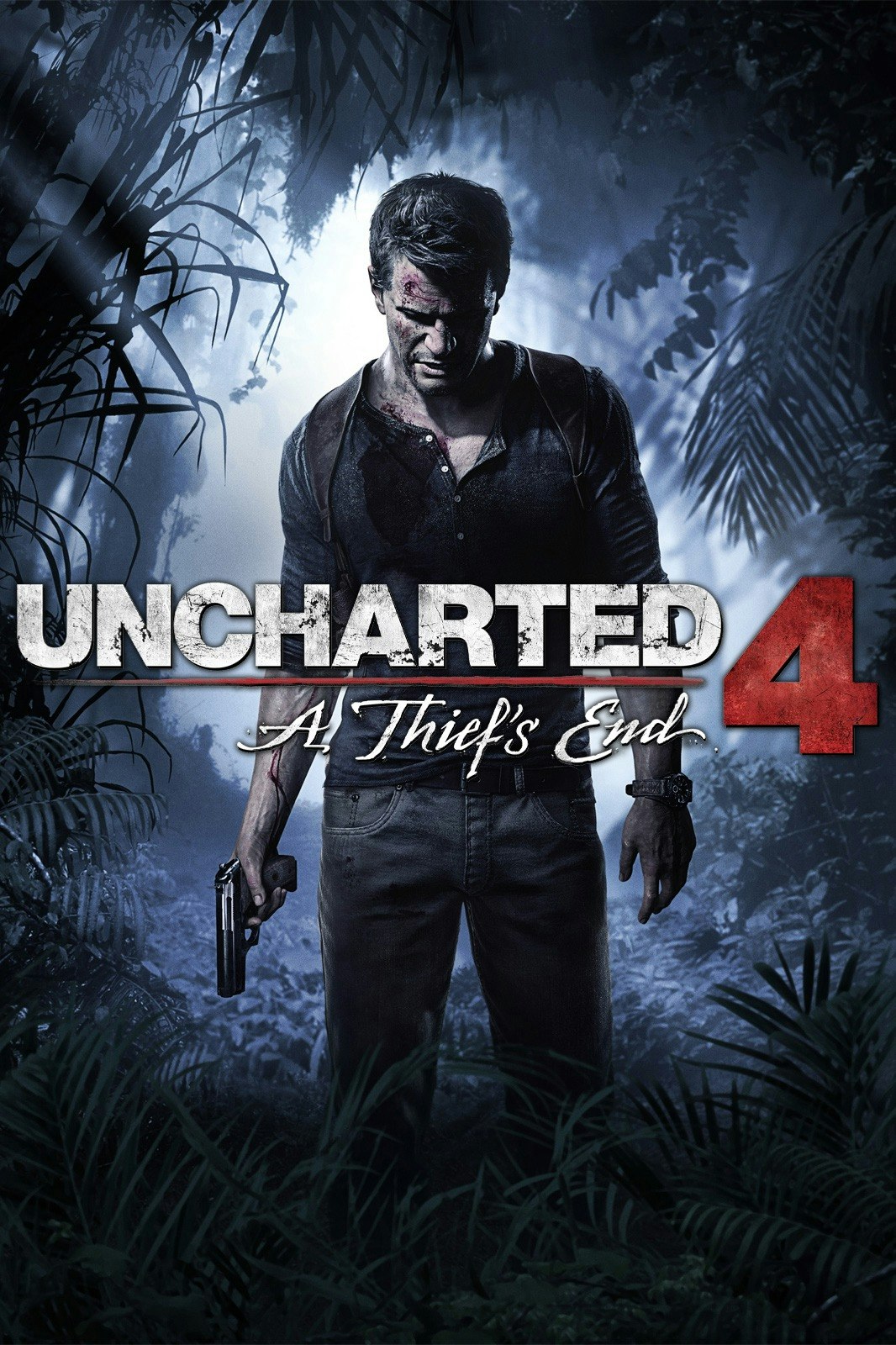
The final few minutes of the film have no dialogue. It’s just the visuals and The Comedown. Is that exciting to you, or daunting? Or both?
Well, I think I’m either stupid, foolish, or reckless enough to more or less only be excited about it. I have a sort of misplaced belief that I’ll somehow make it happen. The movies I really enjoy are ones in which filmmaking has the wisdom and patience to allow the aspects of filmmaking to breathe that aren’t semantic and dialogue-driven. Of course, you need dialogue. I’m not saying there aren’t beautiful movies with fantastic dialogue and amazing soliloquies and speeches and all the rest. But if there is a rookie factor to filmmaking that wiser filmmakers become more Jedi and less Padawan at, it’s the skill of telling a story without battering you with exposition or talking. Extreme examples that I absolutely love would be like the opening of The New World by Terrence Malick, where basically you get a river for about nine minutes and Wagner. I’m in. I love it. It’s great.
Now, you can’t do that all the time. If someone’s hired you as a director to sort of do the next chapter of the X-Men franchise or something and you have a shot of a river for nine minutes, you’re gonna get a phone call and you’re gonna get fired if you don’t back down. But as a general point, the bits that really stick with me are stunning visuals or filmmaking where it’s a bit like a ballet. Where you allow something to breathe. Of course, we need exposition, otherwise, they’ll be something you just don’t know what’s happening. But I don’t know. Even examples like in the original Richard Donner Superman, there’s a shot where Clark is coming of age and he realizes that he has to go out into the world with his abilities. I think the father had died of a heart attack and the mother’s standing in this field like a 20th Century American painting from a famous painter, and it just looks like the most beautiful thing you’ve ever seen. And the dialogue isn’t that important. No doubt John Williams is absolutely nailing the cue, but my point is that those moments are archetypal and they almost become mythological in those kinds of contexts. And when you think about it, there’s not an awful lot of grammar and semantics. The most important thing at that point is poetry. And it’s in the visuals. It's in the cinematography. And thanks to John Williams, you’d probably be half in tears anyway just listening to the piece.
